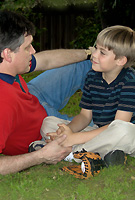 | |
 | |
10.03.06

Leadership in Action is About DilemmasPaul Taffinder writes in The Leadership Crash Course that leadership in action is about dilemmas. In an age where we have more choices than ever before, the leader’s job becomes more urgent. The problem isn’t necessarily that we have so many choices, but what we base our selection of choices on. The leader’s job is to guide this process. This might be called imposing context. Ironically, getting where we want nearly always means not getting what we want. Leader’s frequently must guide people through behaviors and places they would never choose for themselves if left to their own desires. In a society that wants to achieve the desired ends by simply going straight to the desired ends and short-circuiting the necessary intermediate steps, this can be quite a challenge. At times like these, a leader’s self-knowledge becomes all the more important.
Posted by Michael McKinney at 08:44 AM
08.21.06

Leading From WithinFrom the classroom of Harvard Professor Scott Snook comes an article about leadership styles. It reaffirms the importance of the leader’s self-knowledge. This is not just a cursory overview but an understanding of what we really think on issues we would rather not think about. In Leading from the Maze Jeffrey Patnaude writes, “[T]he leader must be awake and fully alert. Like a nighttime traveler attuned to every sound in the forest, the leader must be aware of all possibilities lurking in the shadows. For we can neither challenge not transform what we cannot see.”Professor Snook said: What you believe about human nature influences your leadership style. If you believe people are fundamentally good—good meaning that they're trying to do their best, they're self-motivated, they want to perform—then your fundamental leadership style will be one way. It will be empowering them, getting obstacles out of the way, and setting high goals while maintaining standards.The better we understand ourselves, the more authentic the contribution we can make—shed the image and do the job.
Posted by Michael McKinney at 09:59 AM
06.16.06

The Fred Factor for Kids ... TooI'd thought I'd pass this along for the Father's Day weekend. This is a timely piece from Mark Sanborn author of The Fred Factor one of our picks for Best Leadership Books of 2004. Mark writes: Proverbs 22:6 says, Train a child in the way he should go, and when he is old he will not turn from it. Parents and educators frequently remind me about the importance of teaching the principles of The Fred Factor to children. The only thing better than learning these lessons as an adult is learning them as a child. The sooner someone understands these timeless truths, the sooner they'll start experiencing the benefits in his or her life. Both the individual and the community are served by the integration of these principles and practices. I was fortunate to have good teachers who instilled in me a love for learning. In high school I did a combined vocational education and college prep curriculum. Since I was a farm kid, and had gotten my start in speaking in 4-H, I wanted to belong to the Future Farmers of America (now FFA), and the only way to do that was to take vocational agriculture classes. Without a doubt, the most important skills I learned in high school were through my participation in the FFA. The regular coursework was necessary for my future success in college, but FFA taught me things like teamwork, parliamentary procedure, leadership skills, public speaking and the importance of service. Although at the time I didn't use the same words and terminology I used in The Fred Factor, I was learning the same principles for success in life. Vocational education organizations like FFA, FHA, VICA, DECA and others play a crucial role in teaching students skills rarely learned elsewhere in public instruction. Many students don't get a chance to participate in these organizations, so the involvement of parents in making sure kids learn these things is necessary. Kids need to know that they do make a difference. They need to know that education isn't a preparation for life—education is life. Students shouldn't feel like they're in a holding pattern while in school, unable to truly experience life until after they graduate. They need to understand how to build healthy relationships and use their creativity to create value for themselves, their family and friends, and for an employer. And importantly, young people need to realize that each day is a chance to try again, to be better than the day before, no matter how good or bad the day before. Talk to your kids about the principles of The Fred Factor. If they're old enough, have them read the book and discuss with them the ideas they encounter. We'll all be better for it. Check out the Fred Factor Web Site for resources and to subscribe to The Fred Factor eZine.
Posted by Michael McKinney at 01:20 PM
06.15.06

Fathers: Raise A Generation of Outstanding LeadersThe National Fatherhood Initiative has found that 24-million American children (over a third of all kids in the U.S.) live in homes without their biological father.Additionally, the absence of a dad from so many homes plays a direct role in a number of social ills. Kids in father-deprived homes are more likely to be abused, poor, prone to drug abuse, prone to poor scholastic achievement, and prone to emotional and behavior problems including suicide and crime. A study if violent criminals in U.S. prisons showed that prison populations are overwhelmingly made up of males who grew up without fathers. 60% of convicted rapists, 72% of adolescent murderers, and 70% of all long-term prison inmates came from fatherless homes.  Pat Williams has been going about the country for years stressing the need for fathers and their role in raising leaders. He insists that no child is too young to begin to develop traits that will serve to help them become outstanding leaders. He writes: Kids want to lead. They enjoy setting goals and then taking the steps to achieve those goals. When do kids become bored? When they feel they are being forced to do something they don’t care about. When do they rebel? When they feel they are being told what to do and how to do it. But give then a chance to lead, give them the opportunity and responsibility to make their own decisions, and they will astonish you with their ability to get things done.  You can read an excerpt of The Warrior Within. He is also the author of Coaching Your Kids to Be Leaders.
Posted by Michael McKinney at 12:24 PM
05.22.06

Looking for LeadersWhere to find good leaders has always been an issue. In our search we unfortunately find it easiest to gravitate to the role players — This is a long tough road we have to travel. The men that can do things are going to be sought out just as surely as the sun rises in the morning.In a letter to friend and fellow commander Vernon E. Prichard, Ike took up the theme of leadership he had discussed in his letter to Scrappy Hartle just two days earlier. “Fake reputations,” he wrote, “habits of glib and clever speech, and glittering surface performance are going to be discovered and kicked overboard.” Those who remain are people capable of “solid, sound leadership,” possessed of “inexhaustible nervous energy to spur on the efforts of lesser men, and iron-clad determination to face discouragement, risk and increasing work without flinching.” Those who remain are the people who also possess “ a darned strong tinge of imagination—I am continuously astounded by the utter lack of imaginative thinking among so many of our people that have reputations for being really good officers.” Finally those who escape being kicked overboard are those who are most dedicated and “able to forget . . . personal fortunes. I’ve relived two seniors here because they got to worrying about ‘injustice, ‘ ‘unfairness,’ prestige.’” Need will find leaders, but Ike counseled his friend Prichard to get a jump on need by starting to look right now. “While you are doing your stuff from day to day, constantly look and search among your subordinates for the ones that have those priceless qualities in greater or lesser degree. . . . [Y]ou will find greater and greater need for people upon whom you can depend to take the load off your shoulders.”
Posted by Michael McKinney at 09:51 AM
05.19.06

Leadership Begins at HomeThe Nanaimo News Bulletin reports that Leonard Krog—member of the British Columbia Legislative Assembly—in a speech to the Nanaimo Chamber of Commerce stated, “Community leadership starts at home. The best leadership examples are found in the home by parents who are involved in their communities. People can do small things, like build a community park in their neighborhood, or big things like run for public office or join community groups. Be a leader in your family. That’s how you build a strong and healthy community.”Parents are the earliest and most influential influences on a child. Their examples profoundly affect the kind of leaders they become. Leadership training takes time (think quantity not just "quality") and guidance in every facet of a child’s life from early on. Additionally, leadership needs to be modeled by the parents. It helps if you view all of this in the long-term. The big picture view assists in smoothing out the immature peaks and valleys and helps keep your goals on track. Here are some (not comprehensive) ideas to think on: Take time to know your child. Working with a child’s personality, a parent needs to learn to develop that child’s individual traits and abilities and sometimes temper strengths that left unchecked would become a liability. For example, an assertive, outgoing personality is a great trait in a leader, but without self-control it can be seen as overly aggressive and controlling.  Take the time to point out where they can learn from the example of others. Use examples and outcomes of decisions of both right and wrong approaches to situations. Teach them cause and effect. Choices have consequences. Take the time to understand what problems and issues your child is dealing with and then guide them to the right decisions by applying the right principles. By instilling principles rather than pat answers to problems, you will give them tools to work with that they can apply over and over again in their life. Take the time to praise them when they make the right choices and gently show them the choice they missed when they go astray. Give them age appropriate responsibilities and let them stand or fall on their choices. (Note: Self-esteem comes from knowing you did do or are doing the right thing and should be praised. It’s not generated from unsupported, manipulative comments designed to make kids—or anyone else for that matter—feel good.) Take the time to involve them in family activities and work. This will help them learn teamwork (sharing and considering others) and a good work ethic. Why do all this? Pat Williams (senior vice president of the Orlando Magic) in his book, Coaching Your Kids to be Leaders, quotes Jackson University football coach Steve Gilbert, I tell young people, "It feels good to be a leader!" Success and failure are part of the adventure of life. Young people need to see that good leaders are important in their community—and there are great rewards for being a good leader. Those rewards include a sense of satisfaction and a feeling that what you are doing is meaningful and significant. You don’t always win when you lead, but that’s okay. Young people should be rewarded and encouraged for stepping up and leading, no matter whether they succeed or fail.Krog added some additional thoughts that apply in any leadership training. “What is negatively affecting leadership across the country is the use of polls to gauge public opinion. Good leadership takes a longer term view of issues that may or may not be popular. Polls force governments to make popular, short-term decisions to stay in power. And sometimes leadership involves championing ideas that are not so popular.”
Posted by Michael McKinney at 12:08 AM
|
  |
|
Copyright ©1998-2006 LeadershipNow / M2 Communications All Rights Reserved All materials contained in http://www.LeadershipNow.com are protected by copyright and trademark laws and may not be used for any purpose whatsoever other than private, noncommercial viewing purposes. Derivative works and other unauthorized copying or use of stills, video footage, text or graphics is expressly prohibited. LeadershipNow is a trademark of M2 Communications. |